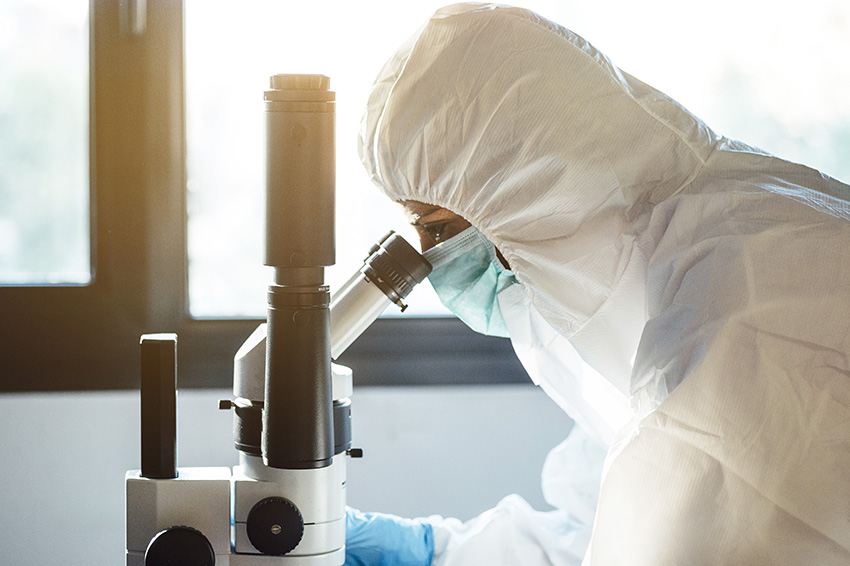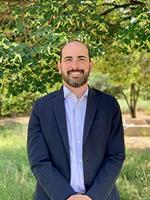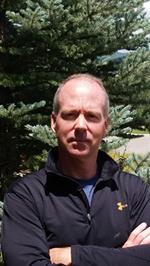MPA alumni Bookman and Butler share experiences of leading COVID responses in Colorado
Joan Fishburn | School of Public Affairs Sep 11, 2020
At both the local and state level, School of Public Affairs alumni have been instrumental in responding to the COVID-19 pandemic. Scott Bookman (MPA '15), Colorado Department of Public Health & Environment incident commander for COVID-19, and Geoff Butler (MPA '19), Battalion Chief, Poudre Valley Fire Authority, recently took some time to answer questions about their current roles addressing COVID-19 and how they have grown as leaders dealing with the challenges posed by the pandemic.
Scott Bookman
Interim Director, Division of Disease Control and Public Health Response
Incident Commander: COVID19
Colorado Department of Public Health and Environment

It is an interesting time to be in a public leadership position. Right now, what does your day-to-day look like during the COVID-19 crisis?
I serve as the incident commander for the Colorado Department of Public Health and Environment (CDPHE). In that role, I oversee our response efforts. I think it's important to separate the response efforts from some of the other policy efforts that are also going on. Our executive director and our senior leadership team are handling a lot of the higher-level policy work.
My job is really to oversee a response that includes our communicable diseases branch, our epidemiologists, and our state labs, and then our emergency coordination function and our emergency operations center—really looking at healthcare surge, consequence management, and fatality management, if we get into a situation like that, which we hope we never need to use. It's running the day to day and then doing the strategic planning about where things may go and how we need to respond to it.
In COVID, everything changes rapidly. We learn new things every day. What we see is that we are going to be at this for some time longer, and our strategy is to continue to build out our capacity. We are hiring as many epidemiologists as we can get on-boarded and working to double, if not triple, the size of our staff at the state lab. We are scaling all of our capacity to meet the needs of Coloradans.
Amy C. Edmondson, from the Harvard Business School, recently wrote: “Transparency is 'job one' for leaders in a crisis. Be clear what you know, what you don't know, and what you are doing to learn more." How does this apply to you in your current role?
Leadership starts at the top. The governor has been very clear, both internally and externally, about his view on being as transparent as possible throughout this response. He certainly leads by example and providing an honest assessment of where we are. In a time where our world is changing so much because of this virus, which is invisible, transparency is absolutely critical to maintaining the public trust. Public trust is then critical to having people understand the importance of these social distancing efforts or the critical importance of wearing masks. The things that will mitigate the worst parts of this crisis are in the hands of the public. Really, we need to make sure in public health that we maintain that trust through transparency, so that our communities will work with us and trust our guidance and our advice.
In COVID, that has been particularly challenging just given that we are learning something new every day about this virus. So sometimes it seems like we are contradicting ourselves because the guidance of a day ago is no longer scientifically sound. Maintaining trust through that is difficult, and again, it is about constantly communicating in a transparent manner.
How does government regain credibility after the COVID crisis among those who have lost faith in its institutions?
It goes back to what I said about honest and transparent communication. It's about admitting the areas where we don't know because it isn't known yet. It's about really being clear in the work we are doing. It's certainly been our goal from the beginning to maintain trust in government. We have an incredibly dedicated team that is working non-stop and has been since January to do all that we can to protect all Coloradans. I think it is important to acknowledge that there have been challenges at the federal level on preparedness and planning. There has been a lack of a coordinated federal response. It is required of individual states to step up.
I'm incredibly proud of the work we have done in Colorado—the work the governor has done leading our team, what we have done at the state public health department to respond to this. There have been challenges because this is unprecedented—to see the healthcare PPE supply chain collapse, to find out that what was in the federal stockpile was not what we thought was in the federal stockpile. To see shortages of ventilators, shortages of medication that is usually readily available are all things that are beyond anything anyone ever imagined. It was beyond our capacity to prepare when the federal government has the cash and the power to move those supplies around and ensure their availability.
We have a long way to go, but I am incredibly proud of the work we have done in the state to keep Coloradans as safe as we can. I think if you look at where we are statistically, compared to other states, we are doing an amazing job here.
Has your idea of what it means to be a public servant changed as a result of this experience?
It has always been an absolute honor and privilege to serve the public, whether it was my time as a paramedic for Denver or my time now serving the state. It is an honor and a privilege to have the trust of Coloradans to maintain their safety. At a time when public health is at the center of this, and there are so many unknowns, and people are scared and vulnerable, it is even more of a privilege to use the skills I have, to work with our teams and our leaders to ensure we do all we can to keep our people safe, to do all that we can do to keep them healthy physically, emotionally and socially in these tough times.
What are the opportunities here for professional growth for you and your team – how do you see strength arising from adversity?
An emergency like this brings everything to the forefront and really challenges how we have all operated before this. I never thought I would do an interview from my basement with my dog sitting next to me, but here I am. I would never have thought we could operate the state emergency operations center virtually, and yet we did. I think this has also strengthened relationships across state governments, between state government and local government and, in many ways, from state government to federal government.
We have been asked to do things together that we have never done before. We have to coordinate so many different lines of effort between so many different agencies. When COVID is done, we will find ourselves much better prepared not only for the next crisis but also to work together day-to-day as a stronger government with the ability to serve our state better.
What are you most proud of having achieved thus far into the pandemic?
There are so many. The greatest achievement is just the day-to-day, non-stop professional work of all of these public health leaders across the state who are doing all that they can to ensure the health and safety of everybody in Colorado. The team of epidemiologists at CDPHE has grown and grown into this incredibly well-oiled machine in partnership with their local public health agencies. Before COVID, the state lab had a $16 million budget and 85 FTEs. By the end of 2020, they will probably be close to 175 FTEs with over $100 million a year operating budget. And so I think how we have scaled to the magnitude of this response in such a short order has been truly a wonderful accomplishment.
I would go back to our efforts, along with those of the governor, to provide the public with the best information we have available and to do all that we can to educate people so that they know how to keep themselves, their loved ones, and neighbors safe in times where it is so hard to understand what is happening.
How has your experience as a student at the School of Public Affairs contributed to your ability to work under pressure?
I think my time in the MPA program brought me a great deal of technical understanding of the work. Organizational design, the law of emergency management—there was a lot of technical learning that has been directly applicable to my career over the last 15 to 20 years.
To me, the thing that is most beneficial from my time in grad school is that the concept of accountability to the public as part of public service was reinforced in so much of my class work, and I now find myself in a situation where transparency is critical. If you view transparency as accountability, it takes me back to my time in school and understanding how important it is for the public to understand what their government is doing—how they are doing it and why they are doing it. I think that is my biggest philosophical learning from my time at school.
Geoff Butler
Battalion Chief
Poudre Valley Fire Authority

It is an interesting time to be in a public leadership position. Right now, what does your day-to-day look like in the midst of the COVID-19 crisis?
As COVID-19 became recognized as a true emerging crisis to which my department would have to adapt, the City of Fort Collins stood up an emergency operations center (EOC), and the Poudre Fire Authority (PFA) established an Incident Management Team (IMT). I became the Fire Branch Director in the former and the Planning Section Chief for the latter. This put me into a cycle of ten-plus-hour days from mid-March into mid-May.
Our initial efforts were focused on internal city and agency adaptations to COVID-19 to stem the exposure while maintaining critical services in a sustainable manner. Additionally, the IMT and EOC had to innovate in our daily operations, adopting the now ubiquitous variety of electronic communications platforms and distancing practices. Mornings started early with a string of video meetings followed by long days of developing adaptive procedures and solving logistical challenges. We also prepared for a surge in COVID-19 cases, which fortunately has not yet materialized. More recently, the EOC and IMT have scaled back to once-a-week meetings and more focus on our other duties.
Amy C. Edmondson, from the Harvard Business School, recently wrote: “Transparency is 'job one' for leaders in a crisis. Be clear what you know, what you don't know, and what you are doing to learn more." How does this apply to you in your current role?
This is a true enough statement, fraught with challenges. My communications and leadership energies are directed internally at the workforce. I have, mercifully, little to do with public relations.
First, in my role with the other governmental agencies through the EOC, I ensured transparency with our PPE stocks and supplies as well as the procedures and issues we were dealing with as a fire agency. PFA is a semi-autonomous special authority, so sharing with the other city departments is not automatic. I ensured they received our daily incident action plan and copies of all new procedural documents and training materials we developed. My capstone was on networked organizational characteristics during major emergencies, so it was nice to practice what I'd investigated.
Second, transparency within the fire department was essential. Uncertainty and crisis breed fear, which begets conflict. Yet, sharing a plan or information that then changes and reverses in days to moments does little to combat uncertainty. There is a delicate balance between transparency and over-communication. The desired end state is trust. My suggestions: (1) Be clear and honest about what you don't know; (2) share what you think you know; (3) share your objectives, but not necessarily the ephemeral details that could produce whiplash and frustration (and let folks know "this is a work in process, we are working on the details"); (4) continuously re-clarify how your plans and actions are tied to the objectives; and (5) brace for fear, pushback, and conflict, and respond with empathy and grace—but firmly.
How does government regain credibility after the COVID crisis among those who have lost faith in its institutions?
A lot is going on right now in various levels and regions of government and society. Should we consider that perhaps crisis heightens underlying and lingering tensions (fear and conflict), sometimes related but often tangential to the crisis at hand? Do we not see this in our personal relationships? Recognizing this can be very constructive. I return to my earlier response: build trust through good communication; respond to fear with empathy and firm leadership; prioritize where possible. For example: “You bring up a valid and long-standing concern that is not part of our immediate crisis response. Let's park this for now and reevaluate in six months.”
What are the opportunities here for professional growth for you and your team – how do you see strength arising from adversity?
Crisis offers fear and opportunity. We get to choose. The COVID-19 crisis has catalyzed or forced innovation and adaptation, much of which will be beneficial to retain moving forward. I don't know that I'll ever drive through crosstown traffic for a routine meeting again. Did I once read (archaic language aside), "War does not make the man, it reveals him"? I have seen a lot of strengths and weaknesses emerge during our recent challenges, in myself, others, organizations, and systems. Make it a mindful act to take time to reflect on the lessons offered.
I have been thrust into new roles and new challenges. I have had to remind folks that this is my first time as a Planning Section Chief (PSC) during a global pandemic (in fact, my first time as PSC for anything). I have tried to embrace the challenges and opportunities without burning myself out. One of the best opportunities here is to strengthen your teams.
My wife, who works in the federal government, said to me at the emergence of COVID-19, "A lot of senior leadership moves on after a crisis like this." Many will move on due to fatigue or just a healthy reevaluation of priorities once the dust settles. This can be an opportunity for professional growth for those who do move on and those left behind.
What are you most proud of having achieved thus far into the pandemic?
Honestly, I've had to be conscientious about keeping my pride out of this. That can bring the predictable hubris and also create an over-investment in plans and achievements to which one needs to remain open to criticism and change. I have been told that I have applied and developed my organizational skills well and contributed a sense of calm and perspective within the team. The former is a skill for which I was previously recognized; the latter, I believe, was a welcome surprise to those accustomed to my more bellicose and profane modus operandi with which they were familiar.
How has your experience as a student at the School of Public Affairs contributed to your ability to work under pressure?
My studies were focused in crisis and emergency management. Some specifics:
- We studied the SARS epidemic and the response in Ontario. I reread this case study last February before Colorado even had a positive COVID-19 case (I think). In addition to sharing some specific lessons with my supervisor, I pointed out that one of the gravest mistakes during major emergency is failing to recognize you're in one until it's too late. My job is to respond to emergencies. And, I have been teaching early recognition of a potential "big" emergency (black swan) and how to front-load your response.
- I had learned about the interplay of federal-state-local agencies during major emergencies. This didn't equip me with all of the answers, but it made me aware of what questions we should be asking and to whom they should be addressed.
- I had learned the importance of pre-established relationships and communication chains with cooperators and stakeholders. This creates a stronger existing (or more readily formed new) networked organization.